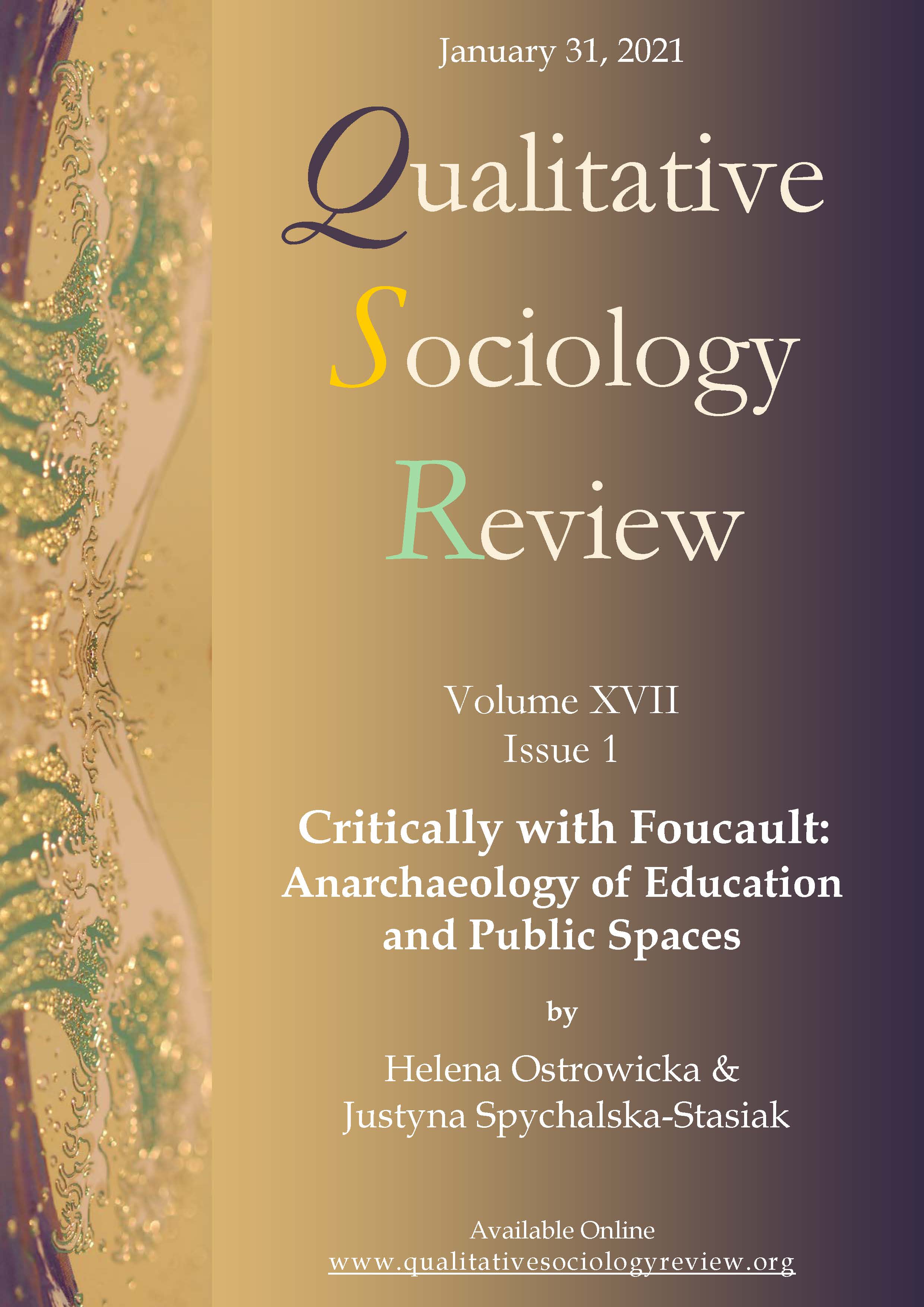Life Strategies of the Parents of Children with Intellectual Disabilities in the Context of Mixed Social Situations
DOI:
https://doi.org/10.18778/1733-8077.17.1.11Keywords:
Disability, Parents, Children, Stigma, Mixed Social SituationsAbstract
This paper aims to analyze the phenomenon of the managing of the stigma of a child’s disability by their parents. Using the concept of stigma by Erving Goffman, I point to its usefulness in understanding the management of stigma by parents of children with intellectual disabilities in the context of mixed social situations. The research utilizes qualitative techniques with special emphasis on unstructured interviews. The data analysis was performed following the procedures of the grounded theory. As studies have shown, parents of children with disabilities adopt various strategies and tactics during the encounters with other persons and institutions while dealing with everyday hardships.
Downloads
References
Aschbrenner, Kelly A. at al. 2010. “Subjective Burden and Personal Gains among Older Parents of Adults with Serious Mental Illness.” Psychiatric Services 61(6):605-611.
Google Scholar
DOI: https://doi.org/10.1176/ps.2010.61.6.605
Barnes, Colin and Geoff Mercer. 1997. Doing Disability Research. Leeds: The Disability Press.
Google Scholar
Belzyt, Joanna I. 2005. Kontakt i komunikacja z osobami niepełnosprawnymi. Aspekty niewerbalne [Contact and Communication with People with Disabilities. Non-Verbal Aspects]. Torun: UMK Press.
Google Scholar
Błeszyńska, Krystyna. 2001. Niepełnosprawność a struktura identyfikacji społecznych [Disability and the Structure of Social Identification]. Warsaw: Wydawnictwo Akademickie Żak.
Google Scholar
Carey, Allison C. 2013. “The Sociopolitical Contexts of Passing and Intellectual Disability.” Pp. 142-166 in Disability and Passing: Blurring the Lines of Identity, edited by J. Brune and D. J. Wilson. Philadelphia: Temple University Press.
Google Scholar
Charmaz, Kathy. 2006. Constructing Grounded Theory. A Practical Guide Through Qualitative Analysis. Thousand Oaks, CA: Sage Publications.
Google Scholar
Docherty, Julie and Kate Reid. 2009. “‘What’s the Next Stage?” Mothers of Young Adults with Down Syndrome Explore the Path to Independence: A Qualitative Investigation.” Journal of Applied Research in Intellectual Disabilities 22(5):458-467.
Google Scholar
DOI: https://doi.org/10.1111/j.1468-3148.2009.00492.x
Freedman Ruth I., Marty W. Krauss, and Marsha M. Seltzer. 1997. “Aging Parents’ Residential Plans for Adults with Mental Retardation.” Mental Retardation 35(2):114-123.
Google Scholar
DOI: https://doi.org/10.1352/0047-6765(1997)035<0114:APRPFA>2.0.CO;2
Garfinkel, Harold. 1967. Studies in Ethnomethodology. Los Angeles: Prentice-Hall.
Google Scholar
Glaser, Barney G. 1978. Theoretical Sensitivity. Advances in the Methodology of Grounded Theory. Mill Valley, CA: The Sociology Press.
Google Scholar
Glaser, Barney G. and Anselm L. Strauss. 1967. The Discovery of Grounded Theory. Strategies for Qualitative Research. Chicago: Aldine.
Google Scholar
DOI: https://doi.org/10.1097/00006199-196807000-00014
Goffman, Erving. 1963. Stigma. Notes on the Management of Spoiled Identity. Harmondsworth: Penguin.
Google Scholar
Goffman, Erving. 1972. Encounters. Two Studies in the Sociology of Interaction. Harmondsworth: Penguin University Books.
Google Scholar
Hałas, Elżbieta. 1987. Społeczny kontekst znaczeń w teorii symbolicznego interakcjonizmu [The Social Context of Meanings in the Theory of Symbolic Interactionism]. Lublin: Redakcja Wydawnictw Katolickiego Uniwersytetu Lubelskiego.
Google Scholar
Heller, Tamar and Catherine Keiling Arnold. 2010. “Siblings of Adults with Developmental Disabilities: Psychosocial Outcomes, Relationships, and Future Planning.” Journal of Policy and Practice in Intellectual Disabilities 7(1):16-25.
Google Scholar
DOI: https://doi.org/10.1111/j.1741-1130.2010.00243.x
Hodapp, Robert M. 2007. “Families of Persons with Down Syndrome: New Perspectives, Findings and Research and Service Needs.” Mental Retardation and Developmental Disabilities Research Reviews 13(3):279-287.
Google Scholar
DOI: https://doi.org/10.1002/mrdd.20160
Hodapp, Robert M., Laraine M. Glidden, and Ann P. Kaiser. 2005. “Siblings of Persons with Disabilities: Toward a Research Agenda.” Mental Retardation 43(5):334-338.
Google Scholar
Johnson, Eric D. 2000. “Differences among Families Coping with Nervous Mental Ill Adults: A Qualitative Analysis.” American Journal of Orthopsychiatry 70:126-134.
Google Scholar
DOI: https://doi.org/10.1037/h0087664
Kościelska, Małgorzata. 1995. Oblicza upośledzenia [Faces of Handicap]. Warsaw: PWN.
Google Scholar
Kroll-Smith, Steve and H. Hugh Floyd. 1997. Bodies in Protest: Environmental Illness and the Struggle over Medical Knowledge. New York: New York University Press.
Google Scholar
Miltiades, Helen B. and Rachel Pruchno. 2001. “Mothers of Adults with Developmental Disability: Change over Time.” American Journal on Mental Retardation 106(6):548-561.
Google Scholar
DOI: https://doi.org/10.1352/0895-8017(2001)106<0548:MOAWDD>2.0.CO;2
Orsmond, Gael I. and Marsha M. Seltzer. 2007. “Siblings of Individuals with Autism or Down Syndrome: Effects on Adult Lives.” Journal of Intellectual Disability Research 51(9):682-696.
Google Scholar
DOI: https://doi.org/10.1111/j.1365-2788.2007.00954.x
Orsmond, Gael I. et al. 2003. “Behavior Problems in Adults with Mental Retardation and Maternal Well-Being: Examination of the Direction of Effects.” American Journal on Mental Retardation 108(4):257-271.
Google Scholar
DOI: https://doi.org/10.1352/0895-8017(2003)108<257:BPIAWM>2.0.CO;2
Phyllis, Solomon and Jeffrey Draine. 1995. “Subjective Burden among Family Members of Mentally Ill Adults: Relation to Stress, Coping, and Adoption.” American Journal of Orthopsychiatry 65(3):419-427.
Google Scholar
DOI: https://doi.org/10.1037/h0079695
Piotrowski, Andrzej. 1998. Ład interakcji. Studia z socjologii interpretatywnej [The Order of Interaction. Studies in Interpretative Sociology]. Lodz: Wydawnictwo UŁ.
Google Scholar
Podgórska-Jachnik, Joanna. 2014. Praca socjalna z osobami z niepełnosprawnością i ich rodzinami [Social Work with People with Disabilities and Their Families]. Warsaw: Centrum Rozwoju Zasobów Ludzkich.
Google Scholar
Seltzer, Marsha M., Frank Floyd, and Jan Greenberg. 2005. “Life Course Impacts of Mild Intellectual Deficits.” American Journal on Mental Retardation 110(6):452-468.
Google Scholar
DOI: https://doi.org/10.1352/0895-8017(2005)110[451:LCIOMI]2.0.CO;2
Strauss, Anselm L. and Juliet Corbin. 1990. Basics of Qualitative Research: Techniques and Procedures for Developing Grounded Theory. Thousand Oaks, CA: Sage.
Google Scholar
Strauss, Anselm L. and Barney Glaser. 1974. Chronic Illness and the Quality of Life. Saint Louis, MO: Mosby.
Google Scholar
Strauss, Anselm L. et al. 1985. Social Organization of Medical Work. Chicago: University of Chicago Press.
Google Scholar
Zakrzewska-Manterys, Elżbieta. 2010. Upośledzeni umysłowo. Poza granicami człowieczeństwa [Mentally Handicapped. Beyond Humanity]. Warsaw: Warsaw University Press.
Google Scholar
DOI: https://doi.org/10.31338/uw.9788323511472
Downloads
Published
How to Cite
Issue
Section
License

This work is licensed under a Creative Commons Attribution-NonCommercial-NoDerivatives 4.0 International License.











